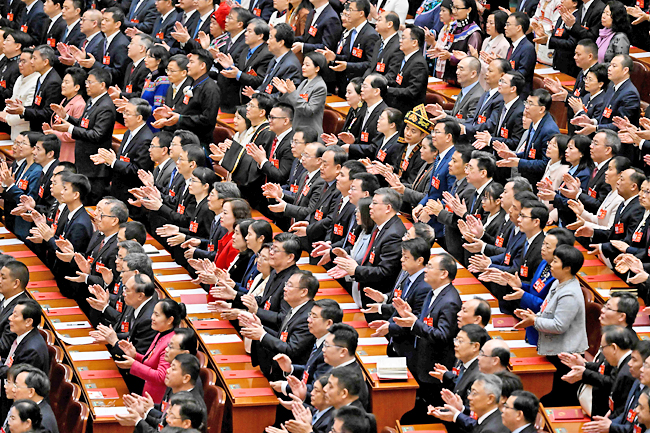BEIJING (AFP) – China’s leaders yesterday wrapped up a week-long key conclave at which they admitted more was needed to revive a sluggish economy battered by an ailing housing market, poor domestic demand and record-high youth unemployment.
Top officials have been upfront about the myriad challenges China is facing, admitting that a modest five per cent growth goal will not be easy and that “hidden risks” are dragging the economy down.
Officials have also moved to strengthen powers to deal with threats to their rule and tightened a veil of secrecy around policymaking, scrapping a traditional annual press conference and vowing to include national security provisions in a raft of new laws.
Delegates to the National People’s Congress (NPC), China’s Parliament, including leader Xi Jinping, gathered at Beijing’s Great Hall of the People to rubber-stamp legislation at 3pm local time as the conclave came to an end.
Among the pieces of legislation approved was a revision to the Organic Law of the State Council, China’s Cabinet, which state media has said will aim to deepen the “leadership” of the ruling Communist Party over the government.
Delegates also approved the country’s state budget and the national economic and social development plan for 2024.

Speaking to media, representatives were uniform in their praise for the government.
Li Dexiang, representing southwestern Guizhou province, told AFP he believed the “government has a good grasp of reality”.
Delegate from eastern Jiangsu province Lyu Caixia said the experience of the parliamentary meeting “pushes one to go forward bravely”.
And Ling Youshi, a delegate from the semi-autonomous city of Hong Kong, said she had experienced the “rigour of deliberating legislation” during her time at the so-called “Two Sessions”.
The tightly choreographed event capped a week of high-level meetings that have been dominated by the economy, which last year posted some of its slowest growth in years.
On Saturday, ministers pledged to do more to boost employment and stabilise the country’s troubled property market.
“Workers face some challenges and problems in employment, and more effort needs to be made to stabilise employment,” Minister of Human resources and Social Security Wang Xiaoping told a press conference.
Housing Minister Ni Hong added that fixing the property market – which long accounted for around a quarter of China’s economy – remained “very difficult”.
Despite official pledges of fresh support, analysts say they are yet to see the kinds of big-ticket bailouts the flagging economy needs if it is to rebound.
“Reviving the economy requires boosting household wealth and income, something China’s leaders clearly aren’t yet ready to do,” said analysts at Trivium, a research firm specialising in China, in a note.


